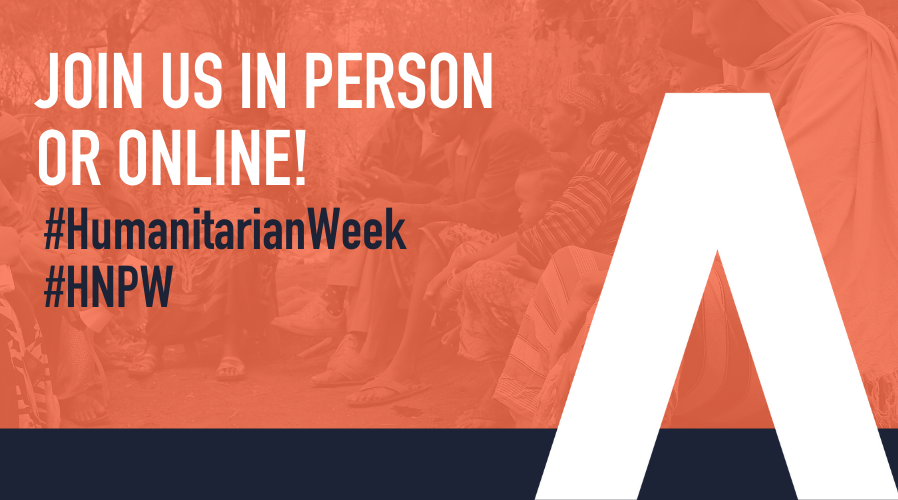Start Network will be lending its voice at the Humanitarian Networks and Partnerships Weeks (HNPW) in May 2022 to push forward our commitment towards locally led and anticipatory action. One of the biggest platforms of its kind, HNPW brings together actors from the humanitarian sector, academia, governments, military, the private sector among others, to collaboratively find solutions to crisis preparedness and response.
This year, Start Network will be leading three HNPW sessions:
Session 1: Building an inclusive compliance landscape: Modular due diligence and a global digital repository
10 May 14:00 - 15:30 (UTC +2)
Following a highly popular and dynamic discussion during the HNPW 2021 due diligence session, Start Network has made important steps in its tiered due diligence journey. Start Network is developing country-level due diligence modules that are appropriate to and reflective of local contexts, with the aim to support its decentralised hub infrastructure and an ambition to bring on board more local and national organisations into its membership. This modular due diligence framework is underpinned by a global digital repository of due diligence information at the global level.
In this interactive session we will hear from a wide range of stakeholders including local NGO representatives such as Naseer Ahmed Channa from Bright Star Development Society Balochistan (BSDSB), donor representatives such as Edward Lewis from Jersey Overseas Aid, and Start Network representatives; Christina Bennett and Vincent Henson.
Session 2: Recovery costs sharing: An important step in rebalancing power and creating a more inclusive system
12 May 09:00 - 10:30 (UTC +2)
Indirect Cost Recovery (ICR) and overhead costs have been a contentious topic for many decades in the humanitarian sector. It is often the case that ICR is not shared equitably between international, national, and local organisations when implementing a project together. This is a problem and a reflection of a system that lacks inclusivity and still holds unfair practices, hindering locally led action. Join us to learn more about strides that some organisations are making towards sharing ICR with local actors.
Some of the speakers at this session include local NGO representatives such as Jahin Shams Sakkhar from Uttaran Bangladesh, Mostak Hussain from Save the Children, Stephen Williams – Advisor to the FCDO, Sajid Raihan and Fhakrul Islam from Start Fund Bangladesh.
Session 3: The power to claim our space: A look at power dynamics within a movement
17 May 13:00 - 14:00 (UTC +2)
In recent years, light has been shone on the humanitarian sector’s Western-centric and colonial practices, leading to a push for locally led humanitarian action. As Start Network aims to move to a decentralised network of National and Regional Hubs, it has begun exploring the power dynamics within the humanitarian system that affect authentic locally led action. This session will be run as a storytelling Talanoa, a Pacific Island tradition, that will explore how power manifests within the sector. It will bring together representatives from locally led networks and Hubs, as well as international allies, to explore how local actors can create and claim their own spaces to exercise power with and in support of crisis-affected communities.
All the above sessions aim to address crucial issues within the humanitarian sector that directly influence locally led movements and action.
The humanitarian system’s power, influence and resources are concentrated in the global north. This imbalance of power has caused local and national organisations to be excluded and disempowered, even though they are deeply rooted in the communities that they support and are responsible for the vast majority of humanitarian responses.
Tackling this problem requires moving towards a system that is accountable to affected and at-risk communities through the leadership of local organisations and through a change in mindset by traditional power holders that allows them to cede power and control. It requires a radical shift towards an approach that pools and shares risk between larger and smaller actors and reflects the value that different organisations bring.
Start Network will also participate in a fourth HNPW session hosted by Anticipation Hub, a joint initiative between the German Red Cross (GRC), the International Federation of Red Cross and Red Crescent Societies (IFRC) and the Red Cross Red Crescent Climate Centre (Climate Centre). We recognise that global humanitarian needs are at an all-time high and continue to grow. Rather than responding to shocks and the surge of humanitarian needs, the international community must work to harness and leverage its ability to predict both shocks (e.g., a slow onset drought, flood, disease or even a conflict) and their humanitarian impact.
Session 4: Anticipatory Action: Reducing impacts of climate change and conflict through innovative collaboration
12 May 09:00 - 10:30 (UTC +2)
This session spotlights evidence-based approaches and highlights best and emerging practices of anticipatory action for slow onset hazards and climate risks, while showcasing innovative methods of leveraging anticipatory action to mitigate compounding drivers of humanitarian needs (conflict, food insecurity, disease). Join us to learn more about anticipatory action and its benefits to an increasingly risk-prone world.
The 2022 IPCC Climate Report dubbed Climate Change 2022: Impacts, Adaptation and Vulnerability noted with great concern that climate risks will continue to intensify and occur more frequently, as global temperatures increase due to carbon emissions. However, it also acknowledged anticipatory action as a merited solution that could allow populations to adapt to these risks and potentially save more lives.
Start Network recognises the reactive nature of the humanitarian system, and through our experience implementing anticipatory action on the ground, we can see approaches and attitudes starting to shift. Since we began our anticipation work, over 60% of our members have acted on the basis of a forecast. But we must go further.
We invite you to join our conversations at HNPW to help shape the humanitarian assistance sector, making strides to achieve a more equitable world for all.

